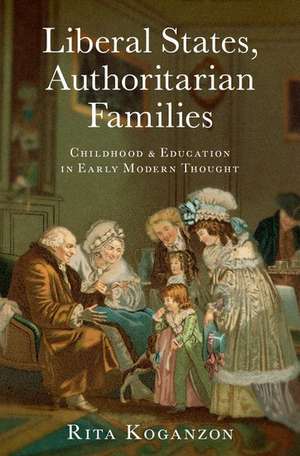Liberal States, Authoritarian Families: Childhood and Education in Early Modern Thought
Autor Rita Koganzonen Limba Engleză Hardback – 7 sep 2021
Preț: 437.40 lei
Preț vechi: 485.29 lei
-10% Nou
Puncte Express: 656
Preț estimativ în valută:
83.71€ • 87.28$ • 69.57£
83.71€ • 87.28$ • 69.57£
Carte disponibilă
Livrare economică 17-22 februarie
Preluare comenzi: 021 569.72.76
Specificații
ISBN-13: 9780197568804
ISBN-10: 0197568807
Pagini: 220
Dimensiuni: 241 x 157 x 18 mm
Greutate: 0.5 kg
Editura: Oxford University Press
Colecția OUP USA
Locul publicării:New York, United States
ISBN-10: 0197568807
Pagini: 220
Dimensiuni: 241 x 157 x 18 mm
Greutate: 0.5 kg
Editura: Oxford University Press
Colecția OUP USA
Locul publicării:New York, United States
Recenzii
Rita Koganzon has composed an incisive work of political and educational philosophy in Liberal States, Authoritarian Families: Childhood and Education in the Early Modern Age. She elucidates the thought of intellectual and cultural giants like Hobbes, Locke, and Rousseau with singular clarity, challenging the conventional readings of their work while also raising important implications to consider for contemporary education. Anyone wishing to engage with these authors and think carefully about the bearing of our cultural moment on education will benefit from Koganzon's exposition. She has done an invaluable service for us all.
...powerful...
Liberal States, Authoritarian Families is a scholarly book, and...a powerful indictment of progressive educational theory.
'You're not the boss of me!' With admirable clarity and judiciousness, Rita Koganzon addresses the uneasy tension between liberty and authority in contemporary liberalism revealed by the question of whether children are—or should be—free. Looking back to earlier thinkers who wrestled with the vexed relationship between authority and liberty, Koganzon finds resources for thinking through the questions we still face today concerning how to educate children to become free citizens.
In this elegantly written and lucidly argued book, Rita Koganzon reexamines the place of the family in early modern thought. Against those who see parental authority as antithetical to liberty, she explores the arguments of Locke and Rousseau to show that authority within the family may well be the best available barrier against slavish conformism fostered either by a dominating state or by mere fashion and unreflective opinion.
...powerful...
Liberal States, Authoritarian Families is a scholarly book, and...a powerful indictment of progressive educational theory.
'You're not the boss of me!' With admirable clarity and judiciousness, Rita Koganzon addresses the uneasy tension between liberty and authority in contemporary liberalism revealed by the question of whether children are—or should be—free. Looking back to earlier thinkers who wrestled with the vexed relationship between authority and liberty, Koganzon finds resources for thinking through the questions we still face today concerning how to educate children to become free citizens.
In this elegantly written and lucidly argued book, Rita Koganzon reexamines the place of the family in early modern thought. Against those who see parental authority as antithetical to liberty, she explores the arguments of Locke and Rousseau to show that authority within the family may well be the best available barrier against slavish conformism fostered either by a dominating state or by mere fashion and unreflective opinion.
Notă biografică
Rita Koganzon is the associate director of the Program on Constitutionalism and Democracy and Assistant Professor of Politics (General Faculty) at the University of Virginia. Her research focuses on the themes of education, childhood, authority, and the family in historical and contemporary political thought. Her research has been published in American Political Science Review, Review of Politics, and History of Education Quarterly, as well as in several edited volumes, and she contributes book reviews and essays to Hedgehog Review, National Affairs, The Point, and Chronicle of Higher Education, among others.
